Increase Clients’ Self-Love: 26 Exercises & Worksheets
 Self-love – An essential human quality that is not narcissism, nor is it selfishness or indulgence.
Self-love – An essential human quality that is not narcissism, nor is it selfishness or indulgence.
As Nestell Bovee said:
“Both our first and last love is self-love.”
Self-love is empathetic and understanding of flaws, and appreciative of the good within each of us.
Self-love is not only important, but necessary for positive emotional health and various facets of success.
This article will guide readers in nurturing and boosting self-love by providing more than 40 useful activities, worksheets, and resources. By taking advantage of this treasure trove of tools and information, individuals will find themselves on a pathway toward a more fulfilled and joyful life.
Before you continue, we thought you might like to download our three Self-Compassion Exercises for free. These detailed, science-based exercises will help you increase the compassion and kindness you show yourself and will give you tools to help your clients, students, or employees show more compassion to themselves.
This Article Contains:
Our 5 Favorite Self-Love Exercises
While you may want to practice greater self-love, the question of how to get there may feel a bit overwhelming – but it doesn’t have to be. There are many self-love tools available, and we’ve compiled a generous list of them right here.
To begin with, here are five of our favorite exercises:
1. The Self-Esteem Check-up
This worksheet provides readers with greater insight into how they feel about themselves. The exercise contains a list of 10 statements referring to various aspects of self-esteem, which are then rated on a 1–4 scale in terms of agreement.
This instrument is useful to see where a person falls in terms of key indicators of self-love – an essential quality for the enhancement of positive wellbeing.
2. My Love Letter to Myself
This exercise promotes self-love by having individuals write love letters to themselves that emphasize their most valued attributes. The first step is to identify the top eight qualities they love most about themselves.
The reader then lists eight ways in which these attributes have benefited them in life.
The final step is for readers to note several ways to honor the above qualities.
This exercise is a loving way for individuals to practice self-love and self-kindness that will benefit them throughout their lives.
3. Emotional Wellness Quiz
The Emotional Wellness Quiz helps individuals identify the degree to which they recognize, accept, and manage feelings. Readers respond to 16 feelings, indicating how often they have experienced each one over the past month.
Scores are created for positive feelings, negative feelings, and all feelings combined.
This quiz helps readers to recognize their emotional IQ, which is an essential step toward enhancing it.
4. Who Am I?
The Who Am I worksheet enables individuals to enhance self-awareness by responding to six open-ended questions followed by several debriefing prompts. Readers first examine the fundamental question: “Who Am I?” In doing so, they can examine their thoughts, feelings, and behaviors by responding to three questions, for example:
- Other people frequently view us differently from the way we see ourselves. How do you think your closest friend or family member would describe you in one paragraph?
Three additional questions are included to identify external self-awareness, for example:
- Now, try to forget others’ perspectives. If you were writing to your past self, what would you choose to include about who you are now?
Finally, readers debrief by considering several aspects of their responses, for example:
- What stands out from your answers?
- What steps can you take to keep building your self-awareness?
This tool provides a simple way for individuals to practice introspection into both internal and external self-awareness, crucial for enhanced self-love.
5. Self-validation and Self-respect
The goal of this exercise is to help clients improve their self-confidence and self-esteem. The first step is to list three self-validating statements they have used in the past week.
The second step involves answering some questions that can help the client implement the process of validation on themselves.
A few questions include:
- What was the situation?
- What did you say?
- What was the outcome?
This exercise can help the user become familiar with using self-validation as a positive method for improving self-confidence and self-esteem.
2 Exercises for Your Group Sessions

Such exercises, which may be utilized by counselors and teachers, are both fun and beneficial to everyone involved.
Here are two examples:
1. Things I Love
This worksheet involves having individuals share and discuss the things they love. Group members are instructed to work through a list of 10 categories and examples, which are provided in the worksheet.
By going through each category and sharing responses out loud, this exercise supports group cohesiveness and meaningful connections.
2. What I See in YOU
This group exercise is designed to enhance positive self-regard by providing each group member with insight into how others perceive them. This activity is based on the premise that individuals often hold negative self-appraisals that are inconsistent with how others seem them.
Group members are instructed to sit in a circle and, following a moment of reflection, say something positive about each person one at a time. After each compliment, the recipient is then asked to repeat the phrase with an “I” statement, for example:
| Positive statement by group member | “I” statement by Mary |
|---|---|
| “Mary is really compassionate.” | “I am really compassionate.” |
| “Mary is considerate of others.” | “I am considerate of others.” |
| “Mary has an infectious laugh.” | “I have an infectious laugh.” |
This powerful exercise helps individuals to realize the wonderful things others see in them and ultimately to work toward internalizing these qualities.
4 Helpful Worksheets
Here are four more helpful worksheets designed to promote self-love:
1. My Personal Beliefs
This worksheet helps individuals identify the beliefs and judgments they hold about themselves. The first step is to explore self-appraisals by responding to 10 open-ended questions.
The second step involves debriefing on those responses, which is aided by several prompts.
This exercise adds value by enabling people to first recognize their self-appraisals and then to replace them with those that are more self-loving.
2. I Will Survive
This worksheet helps readers appraise their coping skills and support systems used to deal with stress and adversity. Readers first identify a personal challenge they dealt with in the past. This involves writing freely about the event, as well as any feelings associated with it. They then consider how they survived the challenge and the personal resources they used to get through it.
For the second part of the worksheet, readers reflect on their external social support system. They first consider a meaningful goal or wish and write about it. Lastly, readers then consider a compliment they received that is related to the above goal or wish.
This instrument is a valuable way for people to recognize the strengths they have used in the past to overcome difficulties. In doing so, they will be in a better position to draw upon such strengths when encountering future challenges.
3. Exploring Character Strengths
The goal of this exercise is to help people recognize personal character strengths, which are described in terms of six virtue categories.
After reflecting on how they effectively dealt with past experiences, readers answer 10 open-ended questions designed to reveal character strengths.
Peterson and Seligman (2004, p. 4) noted that “character strengths are the bedrock of the human condition and that strength-congruent activity represents an important route to the psychological good life.”
This exercise provides an easy way for individuals to identify and nurture these powerful qualities.
4. Setting Valued Goals
This worksheet supports individuals in identifying personal values and creating goals toward achieving them. Readers first respond to open-ended questions assessing core personal values.
Next, from a list of 10 value domains, readers identify the top three they feel are important.
Readers then provide examples of how each of the values functions in daily life, as well as goals for achieving each of them. This worksheet offers a straightforward and meaningful way for people to reflect upon the values they hold dear and to create actionable ways to bring them to life.
Daily Self-Love: 3 Activities and Sheets

By adding them to your daily routine, you will find that self-love comes naturally and is ultimately internalized.
Here are four ways to make self-love a daily habit:
1. Self-Love Journal
This worksheet guides individuals in engaging in daily journaling that promotes self-love and self-compassion, as well as healthy emotional self-expression. Readers are directed on how to journal and are provided with 10 prompts, for example:
- List three things – or people – that you’re grateful for today.
- What is one personality trait that you feel proud of?
Self-love journaling is a terrific way for individuals to remind themselves of their unique and wonderful attributes, which often go unnoticed as people go about their lives.
2. Self-Compassion Pause
This simple meditation provides an excellent way for individuals to uncover a more self-compassionate way of relating to themselves. Readers are instructed to follow 15 steps that can be spread out across numerous sessions. A few examples of statements that they can repeat include the following:
- May I be filled with love and kindness.
- May I be happy and at ease.
- May I be safe.”
Several guided meditation instructions are also provided, for example:
- Bring awareness to your breath for a few moments, paying attention to each inhalation You may place one hand on top of your chest and feel the warm sensation this may bring.
By regularly practicing this meditation, individuals are more likely to experience self-compassion during difficult times.
3. Catch Yourself Being GREAT
This fun worksheet uses positive reinforcement to boost positive self-regard. Readers are first asked to design a reward jar, using pens, stickers, or other art supplies. In doing so, a simple jar is transformed into a lovely object in which important messages will be stored.
The second step is to print the “Monthly Good Deeds” calendar and fill it in for the corresponding month. Then, each time they do a good deed for themselves or someone else, individuals add a gold star for that particular day. Examples of good deeds are also provided.
For the next step, each time a good deed is added to the calendar, a specified amount of money is inserted into the jar. By the end of the month, the money is used toward a special reward.
This exercise is guided by classic behavioral research by B. F. Skinner (1948), who demonstrated that desirable responses are increased when associated with meaningful rewards.
Subsequent studies have found an abundance of evidence supporting the power of positive reinforcement in increasing prosocial behaviors in both children (e.g., Lucyshyn, Dunlap, & Albin, 2002; Ramaswamy & Bergin, 2009) and adults (e.g., Martin, 2005; Robison, 2006).
How to practice self love – Psych2Go
Self-Love and Self-Compassion: 12 Useful Techniques
There are many ways to bring more self-love and self-compassion into your life. Many of these practices are easy and even free, with invaluable benefits.
Here are 12 ideas:
- Avoid labeling yourself: We often go through life with self-defeating labels that we may have connected with ourselves long ago (e.g., I’m not lovable, I am unsociable, etc.). Think about any labels you may be carrying and work toward substituting them with positive ones.
- Don’t deprive yourself: If you are trying to diet or do something else difficult, be careful not to cut out too much pleasure from your life. This often leads to feelings of self-deprivation, which may sabotage your goal.
- Listen to your gut/establish boundaries: If something doesn’t feel right deep in your gut, LISTEN!!
- Make your needs clear: Few of us are mind readers. If someone in your life is letting you down, make sure they are fully aware of what you need.
- Nurture yourself: This may be done a thousand ways. Think of what brings you peace and do more of it.
- Prioritize your health and happiness: It is often the case that people are so busy caring for others that they place their own needs on the back burner. Don’t do this. You are of no value to anyone else if you are sick or miserable.
- Remind yourself of your positive qualities each day: By using positive affirmations, you will feel better about yourself and your ability to take on the day.
- Make peace with your past: By letting go of old hurts, you aren’t letting those who caused you pain off the hook. Instead, you are allowing yourself to move forward in a way that enables you to embrace the present.
- Reward yourself: This is psych 101, as we are all guided by positive reinforcement. If you want to do more of something, reward yourself. The reward doesn’t need to be significant, just meaningful.
- Don’t sabotage your health and happiness: Watch for destructive thoughts or behaviors that you may use unconsciously (e.g., causing chaos in a relationship out of fear of abandonment).
- Watch out for black-and-white thinking: Do not fall into the black-and-white trap. For example, if you’re trying to eat better and have a piece of cake, that’s okay. You are not a failure. Enjoy your cake, and continue to nurture yourself with healthier food next time.
- Take care of your body through healthy eating: Remember that everything you put in your body is either fighting disease or feeding it. Do the necessary meal planning to ensure that you have plenty of healthy food on hand that will nurture your body and soul.
A Look at Radical Self-Love Exercises

Taylor (2018, p. 6) described it as “deeper, wider, and more expansive than anything we would call self-confidence or self-esteem… Including the word ‘radical’ offers us a self-love that is the root or origin of our relationship to ourselves.”
Here are four ways to enhance radical self-love:
1. Self-Love Sentence Stems
This exercise may be used as a way to either inspire self-love journaling or as a standalone practice for those who prefer not to journal. Instructions are simple; the reader simply fills in the blank in a series of 20 statements.
By responding to these statements, individuals are better able to nurture and practice greater self-love, self-kindness, and self-compassion.
2. Spotting Self-Love
This worksheet helps readers to recognize self-deprecating beliefs and then to replace them with self-kindness. Readers are instructed to read two vignettes, followed by two differing responses.
Each of the responses is then rated on a scale. Once they assess the responses, readers note their preferred responses and rates, and then write down the steps they might take to respond more consistently with their favorite answer in the future.
The vignettes provide readers with challenging situations.
For the final step in the exercise, the readers consider their reactions to the vignettes by responding to several questions.
By including vignettes, this worksheet provides readers with realistic, relatable examples of ways to enhance self-love.
3. Stacking the Deck – Radical Self-love Cards to Brighten Each Day
With this fun exercise, individuals create self-affirmation cards as a way to inspire, motivate, and enhance self-love. Readers are instructed to collect a stack of blank cards, art supplies (e.g., pens, stickers, photos, cut-outs, etc.), and positive affirmations, for example:
- “You, yourself, as much as anybody in the entire universe, deserve your love and affection.” (Buddha)
- “You’re imperfect, and you’re wired for struggle, but you are worthy of love and belonging.” (Brené Brown)
Readers then decorate each card using a positive affirmation on each, along with artwork. The beauty of this exercise is that it results in creative and unique positive affirmation cards that individuals may take with them to promote self-love wherever they go.
Science of Self-Acceptance Resources
Helpful resources to improves self-acceptance.
The Science of Self-Acceptance Masterclass©
To support clients in enhancing self-acceptance, PositivePsychology.com offers the Science of Self-Acceptance Masterclass©. This innovative program provides practitioners with a research-based approach that will help clients divert their unhealthy attempts to increase self-esteem (an often unachievable goal) toward the much more useful construct of self-acceptance.
Taught by a highly experienced psychologist and researcher, Dr. Hugo Alberts, this course promotes healthy relationships with the self by acknowledging that low self-acceptance is the basis for many psychological and emotional issues. Dr. Alberts notes that despite high self-esteem, achieving a meaningful and contented life is an unrealistic objective in the absence of self-acceptance.
The masterclass contains eight modules of live recordings; a comprehensive science-based handbook; and numerous audio files, worksheets, exercises, illustrations, PowerPoint slides, and other useful resources. Overall, by guiding individuals in how to change approval-seeking narratives, the masterclass promotes a deep and long-lasting sense of worthiness.
Along with the masterclass, several self-awareness books substantiate the importance of self-love.
Here are five examples:
1. The Mindful Self-Compassion Workbook
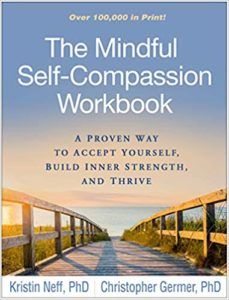
This science-based workbook provides readers with numerous resources and activities aimed at enhancing greater self-kindness and self-compassion.
It contains an eight-week mindful self-compassion program, which includes guided meditations and practical exercises, and various vignettes focused on common issues.
The goal of the book is to provide readers with valuable tools aimed at promoting self-compassion and the numerous positive outcomes associated with it.
Available from Amazon.
2. The Strength of Self-Acceptance
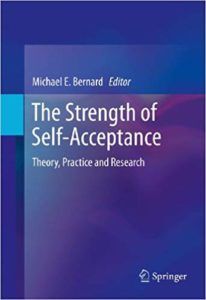
This book acknowledges the link between self-acceptance and positive mental health outcomes. It includes a comprehensive collection of research supporting the benefits of self-acceptance.
Insight from numerous leaders in the area of self-acceptance is included (e.g., Maslow, Rogers, Ellis, etc.), as well as knowledge drawn from Buddhist philosophy and Christian scripture.
The book provides a valuable research-based tool for practitioners intending to enhance positive fulfillment and self-acceptance in their clients.
Available from Amazon.
3. The Happiness Trap
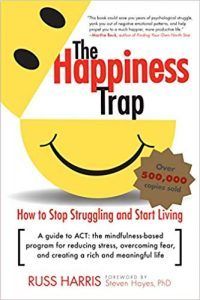
This book describes the research-grounded psychotherapeutic approach of Acceptance and Commitment Therapy (ACT).
Rather than trying to change oneself, the technique outlined in the book guides readers in how to develop mindfulness that will allow them to live in the moment. In doing so, ACT helps individuals to minimize self-doubt and stress, thereby enhancing life satisfaction and meaning.
Available from Amazon.
4. How to Be an Imperfectionist
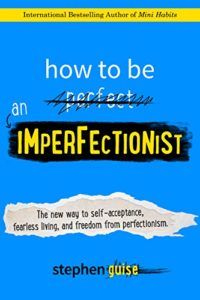
This book contains simple science-backed techniques and is based on the premise that continuously striving to be perfect is a damaging mindset fueled by self-doubt and the need for approval.
The author describes the freedom that comes with being an imperfectionist. In doing so, individuals can remove the limits of perfectionism, enabling them to achieve positive wellbeing by accepting their flaws and mistakes.
Available from Amazon.
5. The Self-Acceptance Project
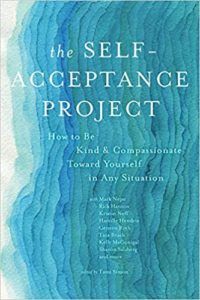
This book contains a powerful collection of essays aimed at helping readers avoid the endless self-judgment and lack of satisfaction associated with low self-acceptance.
Numerous experts and spiritual guides contributed to the book, providing insights into such areas as removing the trance of unworthiness (Tara Brach), reconnecting with a sense of aliveness (Mark Nepo), moving from self-criticism to self-compassion (Dr. Kelly McGonigal), and practicing compassion for the self-critic (Dr. Kristin Neff).
With its 19 essays, the book provides readers with the inspiration and practices needed to establish meaningful, loving, and compassionate relationships with themselves.
Available from Amazon.
A Take-Home Message
Rockwell (2019) speaks of the necessity of creating a radical self-love movement with the power of mindfulness and love as the healing balm.
Unfortunately, without this healing balm, many of us grapple with feelings of low self-worth, guilt, and inadequacy that do nothing but enhance misery. Yet, we can turn these thoughts around in a way that is both kind and loving to the self. Doing so is worth the effort, as the benefits of practicing self-love are well supported by scientific literature.
This article has provided numerous worksheets, activities, resources, and ideas to get you started on your journey to greater self-love. Remember, not only is there is no selfishness in self-love, but as the Dalai Lama said:
we can never obtain peace in the outer world until we make peace with ourselves.
We hope you enjoyed reading this article. Don’t forget to download our three Self-Compassion Exercises for free.
- Bernard, M. (2013). The strength of self-acceptance: Theory, practice and research. Springer.
- Gaskell, A. (2017). New study finds that collaboration drives workplace performance. Forbes. Retrieved on July 9, 2020 from https://www.forbes.com/sites/adigaskell/2017/06/22/new-study-finds-that-collaboration-drives-workplace-performance/#693118213d02
- Guise, S. (2015). How to be an imperfectionist: The new way to self-acceptance, fearless living, and freedom from perfectionism. Selective Entertainment.
- Harris, R., & Hayes, S. (2011). The happiness trap: How to stop struggling and start living: A guide to ACT. Trumpeter.
- Linley, P. A. (2008). Average to A. Realising strengths in yourself and others. CAPP Press.
- Lucyshyn, J., Dunlap, G., & Albin, R. (2002). Families and positive behavior support: Addressing problem behavior in family contexts. Paul H. Brookes Publishing.
- Martin, A. (2005). The role of positive psychology in enhancing satisfaction, motivation, and productivity in the workplace. Journal of Organizational Behavior Management, 24, 113–133.
- Neff, K., & Germer, C. (2018). The mindful self-compassion workbook: A proven way to accept yourself, build inner strength, and thrive. Guilford Press.
- Peterson, C., & Seligman, M. (2004). Character strengths and virtues: A handbook and classification. Oxford University Press.
- Ramaswamy, V., & Bergin, C. (2009). Do reinforcement and induction increase prosocial behavior? Results of a teacher-based intervention in preschools. Journal of Research in Childhood Education, 23, 527–538.
- Robison, J. (2006). In praise of praising your employees: Frequent recognition is a surefire — and affordable — way to boost employee engagement. Gallup. Retrieved on July 9, 2020, from https://www.gallup.com/workplace/236951/praise-praising-employees.aspx
- Rockwell, D. (2019). Mindfulness in psychotherapy and love as the healing balm. The Humanistic Psychologist, 47, 339–343.
- Simon, T. (Ed.). (2016). The self-acceptance project: How to be kind and compassionate toward yourself in any situation. Sounds True.
- Skinner, B. F. (1948). ‘Superstition’ in the pigeon. Journal of Experimental Psychology, 38, 168–172.
- Taylor, S. (2018). The body is not an apology: The power of radical self-love. Berrett-Koehler Publishers.
Let us know your thoughts
Read other articles by their category
- Body & Brain (49)
- Coaching & Application (57)
- Compassion (26)
- Counseling (51)
- Emotional Intelligence (24)
- Gratitude (18)
- Grief & Bereavement (21)
- Happiness & SWB (40)
- Meaning & Values (26)
- Meditation (20)
- Mindfulness (45)
- Motivation & Goals (45)
- Optimism & Mindset (34)
- Positive CBT (28)
- Positive Communication (20)
- Positive Education (47)
- Positive Emotions (32)
- Positive Leadership (18)
- Positive Parenting (4)
- Positive Psychology (33)
- Positive Workplace (37)
- Productivity (16)
- Relationships (46)
- Resilience & Coping (36)
- Self Awareness (21)
- Self Esteem (37)
- Strengths & Virtues (31)
- Stress & Burnout Prevention (34)
- Theory & Books (46)
- Therapy Exercises (37)
- Types of Therapy (64)


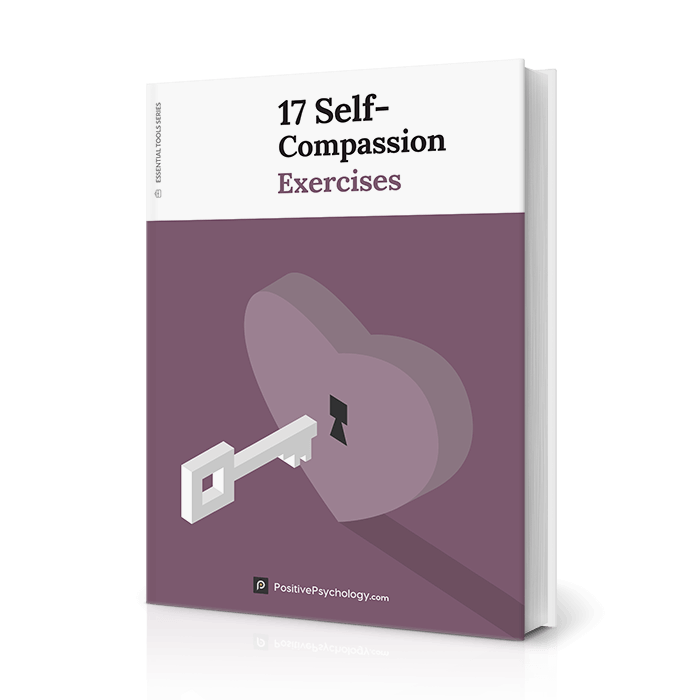



What our readers think
Great Resources, very useful. Thank you so much for sharing them.
These worksheets don’t help me at all. It’s literally impossible for me to think positively about myself because I know I’m just lying to myself. Almost everyone I meet actively dislikes me too, so it’s not like it’s all in my head. Just gonna off myself I think. Been trying to years to not hate myself and I haven’t made any progress at all. Wish I was aborted
Hi Bb,
If you are struggling with severe symptoms of depression or suicidal thoughts, please call the following number in your respective country:
USA: National Suicide Prevention Hotline at 988;
UK: Samaritans hotline at 116 123;
The Netherlands: Netherlands Suicide Hotline at 09000767;
France: Suicide écoute at 01 45 39 40 00;
Australia: Lifeline at 13 11 14
Germany: Telefonseelsorge at 0800 111 0 111 for Protestants, 0800 111 0 222 for Catholics, and 0800 111 0 333 for children and youth.
For a list of other suicide prevention websites, phone numbers, and resources, see this website: https://en.wikipedia.org/wiki/List_of_suicide_crisis_lines
Please know that there are people out there who care and that there are treatments that can help.
– Nicole | Community Manager
Hope that you found the Mental Health support that you need Bb.
excellent resources available here! thank you
Really a great article , it’s a thought provoking article .Everyone should go through this.
This is an amazing article and extremely helpful. Thank you so much for sharing this.
I felt to share the gratitude with the author.
M.